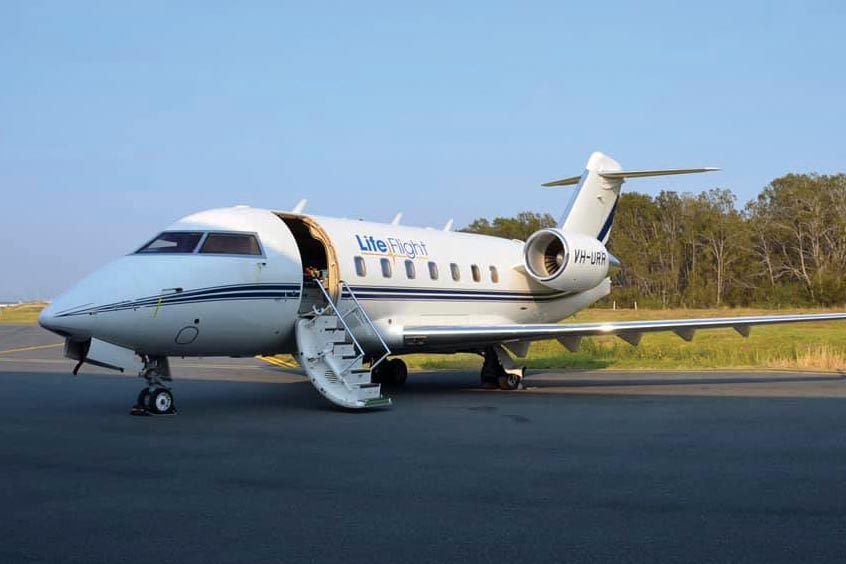 The monthly news publication for aviation professionals.
The monthly news publication for aviation professionals.

Three RACQ LifeFlight Rescue Air Ambulance jets are now on standby to airlift suspected or confirmed coronavirus and other patients, from Queensland regional centres, under an upgraded deal signed off by the State Government today.
The State Government expanded its long-running service agreement with the aeromedical charity, to ensure the air ambulances are exclusively available for Queensland Health tasks. The arrangement increases the number of RACQ LifeFlight Rescue Air Ambulance jets from the original two aircraft announced by Health and Ambulance Services Minister Dr Steven Miles last week to a total of three jets.
The trio of jets will be assigned to move COVID-19 and other patients from regional areas to medical facilities where they can receive higher levels of care, when necessary. It is a proactive step by the Queensland Government to guarantee that patients in more remote parts of the state have access to appropriate medical treatment in major centres when they need it most.
“The RACQ LifeFlight Rescue Air Ambulance jets are extremely suitable for this type work as they're used primarily for high-acuity, long-range patient transport and can operate day or night, in all kinds of weather,” LifeFlight coordination centre director Brian Guthrie says.
The designated jet fleet provided by RACQ LifeFlight Rescue, will see one of the organisation's Challenger 604 jets based in Brisbane. A second Challenger 604 jet will be based in Townsville, and hat aircraft will be complemented by a Learjet 45 to be positioned at the same base.
The combination of both types of aircraft increases response capability and versatility, allowing RACQ LifeFlight Rescue aeromedical staff to respond to patients, as they are tasked by Queensland Health.
“The Learjets can fly at over 820 kilometres an hour, while the Challenger can reach 1,050 kilometres an hour,” Mr Guthrie said. “Our aeromedical crews are on 24/7 standby and can be airborne within 90 minutes of the first activation call from our central coordination centre.”
The twin-engine business jets, which have been converted into air ambulance aircraft, are the flying equivalent of an intensive care unit.
“In preparation for transporting suspected and confirmed coronavirus patients we have adjusted the configuration of both aircraft so they're able to have either have a single stretcher or a dual stretcher, depending on the acuity of the patient,” Mr Guthrie said.
RACQ LifeFlight Rescue critical care doctors and flight nurses have already participated in the safe transfer of a number of suspected and confirmed coronavirus patients, so those patients can be appropriately treated within a hospital environment. RACQ LifeFlight Rescue and Queensland Health are united in prioritising the safety of the community at large, patients, the flight medical staff and the aviation crew who fly the jets.
“Protocols and standard operating procedures have been adopted, including doctors and nurses being required to wear protective masks, goggles, gloves and suits, as well as undertake appropriate decontamination measures, after they are in contact with suspected or confirmed coronavirus patients,” Mr Guthrie said.
RACQ LifeFlight Rescue will continue to work closely with senior clinicians and Queensland Health to monitor and review standard operating procedures as knowledge of the virus continues to evolve.
“Our understanding and response to the management of coronavirus continues to develop, and we are guided by the advice of health authorities and medical experts on the most effective measures to protect patients and staff,” Mr Guthrie said.
RACQ spokesperson Renee Smith said the club was proud to be able support its members and Queenslanders, who were going through incredibly tough period, with its sponsorship of these lifesaving jets. “At RACQ, we're really glad to be able to help people, not only on the road side, but also in the air right across the state,” Ms Smith said. “The RACQ LifeFlight air ambulances are critical in getting regional people the support they need, and never have they been more important than at this time. It's great to be able to bring Queenslanders peace of mind and reassurance that our two organisations continue to work together, to support them. We want to thank the crew of doctors and the wider team for the work they do each and every day saving lives, and transporting vulnerable people to medical treatment.”
The LifeFlight Foundation is working hard, to raise money to help offset the cost of expanding Covid-19 response capabilities across the organisation.